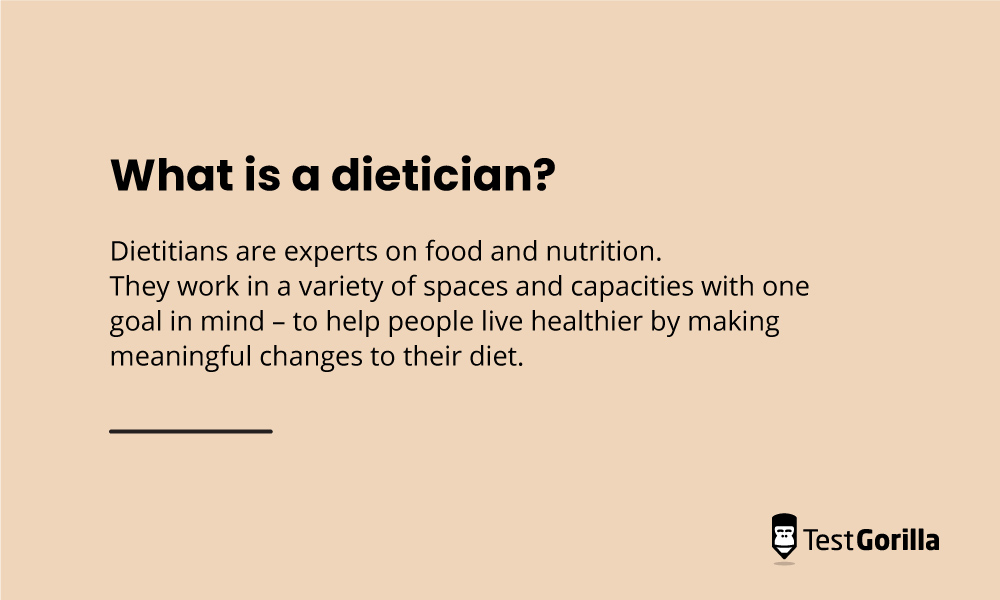All Categories
Featured
Table of Contents
-1
In the USA and lots of other countries, a dietitian is a board-certified food and nutrition specialist. They are highly informed in the area of nutrition and dietetics the science of food, nutrition, and their effect on human health. With extensive training, dietitians get the knowledge to offer evidence-based clinical nutrition therapy and dietary therapy customized to meet a person's needs.
-1To clear up, the credentials of RD and RDN are interchangeable. RDN is a much more recent designation. Dietitians can pick which credential they would certainly rather use. To make these credentials dietitians-to-be must initially earn a bachelor's degree or comparable credit histories from a certified program at an university or college. Typically, this needs an undergraduate scientific research degree, including courses in biology, microbiology, natural and inorganic chemistry, biochemistry, anatomy, and physiology, as well as more specific nourishment coursework.
Paediatric Nutritionist
-1This permits them to analyze acute requirements, focusing on life-threatening problems. Inpatient and outpatient dietitians likewise give nourishment education and learning to individuals with specialized requirements, such as those freshly out of surgical procedure, in cancer cells treatment, or diagnosed with chronic ailments like diabetes or kidney disease. In the outpatient setting, they provide a lot more in-depth nutritional counseling working towards a nutrition-oriented goal.
-1They can also promote for public policies with a concentrate on nourishment, food, and health problems. Study dietitians commonly work in study health centers, companies, or universities. They operate within a study team headed by a primary private investigator and bring out nutrition-focused treatments. Once dietitians have made their credentials and are operating in the area, they can go on to focus on a particular subcategory, such as pediatrics or sporting activities dietetics.
-1Others might work as health and nourishment specialists in media or as public audio speakers (Renal Dietitian). Dietitians are certified to manage nutrition therapy throughout a span of acute and persistent conditions.
Nutritionist Recommended Diet – Salter Point
-1In numerous states, such as Alaska, Florida, Illinois, Maryland, Massachusetts, and Pennsylvania, RDs and CNSs are approved the very same state certificate, usually called a Qualified Dietitian Nutritionist (LDN) license. In states that don't regulate using this term, anybody with an interest in diet or nourishment might call themselves a nutritionist.
-1Because uncredentialed nutritional experts usually do not have the knowledge and training for medical nourishment therapy and nutrition counseling, following their recommendations might be thought about harmful (). Prior to speaking with a nutritionist, you might want to examine whether your state controls that might use this title. In the united state states that don't manage the term, no degrees or credentials are called for to be a nutritionist.

-1
In states that do mandate licensure, the CNS or RD credential might required. Those with CNS qualifications are wellness specialists like nurses or physicians with sophisticated wellness degrees that have chosen additional coursework, completed supervised method hours, and passed an examination managed by the Board for Qualification of Nutrition Specialists.
-1While several of these strategies might have durable scientific support, others might not. Offering nourishment recommendations without the correct understanding and training can be dangerous, specifically when counseling those with health and wellness problems. Because of this, if you are taking into consideration speaking with a nutritionist, you might intend to ask if they are a CNS or have state licensure or certification, or an additional credential.
Registered Holistic Nutritionist – Salter Point
-1Numerous states especially regulate this term. Furthermore, nutritionists might pursue an advanced CNS qualification.
-1It can be testing to assist people make authentic, long-term changes in their lives. Nevertheless, when you obtain an effective instance, the benefit can be profoundly gratifying. If it's a profession choice that you desire to pursue, there are 2 primary career options readily available to you. Both dietitians and nutritional experts give a variety of nutrition-based services to customers.
-1They have to have finished some level of education and learning in their area. They are likewise called for to have completed as much as a year of monitored job, working within a directed program at a healthcare facility, providing company, or neighborhood body. Dietitians have much higher expectations positioned on their abilities and level of expertise.
-1This implies that there is no body that manages their qualifications and no specifically strict guidelines that nutritionists requirement to follow in order to be able to exercise. Dietitians, on the various other hand, are signed up with nationally recognised bodies, such as the Dietitians Organization of Australia. They need to abide by the National Competency Criteria for Dietitians.
Women’s Health Dietitian – Salter Point

-1
However, you can exercise as a nutritionist without the same level of accreditation as a dietitian. Nutritionist training courses can differ in length and top quality, with some as short as 6 weeks and covering much less content than a dietetics course. Depending upon your education and learning provider, you can gain a substantial amount of knowledge through studying a basic nutrition program; however it is essential to check out the training course material before beginning.
-1This can consist of attending industry seminars or checking out sector publications. Nutritional experts, on the various other hand, normally earn their qualifications in order to supplement other credentials and offer much better advice to their clients. Nutritionists can gain work in a large range of fields, consisting of public health advice, recommendations for individuals, and functioning with private organisations.
-1Nutritional experts can function with sporting organisations, gyms, institutions and advise media outlets on basic terminology and proper use of terms. Dietitians can work in most of the exact same roles as nutritionists.
Weight Management Nutritionist – South Perth
-1Dietitians commonly function with even more medically delicate customers. Since of the high level of understanding called for to offer services to these individuals, only recognized dietitians are permitted to offer treatment.
-1In Australia there is a difference between a dietitian and various other nutritional health and wellness service providers including nutritional experts. All dietitians are nutritionists, however nutritionists without a dietetics credentials can't call themselves a dietitian. While there are resemblances between a dietitian and nutritionist there are differences in credentials and regulation. The dietetic occupation is managed and fulfills strict standards as laid out by the National Alliance of Self Regulating Health Professions (NASRHP).
-1Dietitians with the Accredited Practising Dietitian (APD) credential dedicate to continuous training and education and learning throughout their jobs. They comply with our code of conduct. Dietitians have the knowledge and abilities found in the National Competency Standards for Dietitians. As a profession, nutritionists are not controlled in Australia under NASRHP or accredited under a single regulative body.
Certified Dietitian Nutritionist – Salter Point
-1If you have a persistent health problem and a treatment plan from your general practitioner, you may be able to claim a Medicare discount when you see an APD. Discover much more regarding aid with expenses when seeing a dietitian. The main objective of people operating in the career of dietetics is embodied in this statement: The occupation of dietetics contributes to the promo of health and the prevention and treatment of disease by optimising the nourishment of populaces, neighborhoods and individuals.
Latest Posts
Tips To Find The Right Dietitian To Work With – Withers 6230
Arfid - Dietwise.net.au – Cable Beach
Freebies